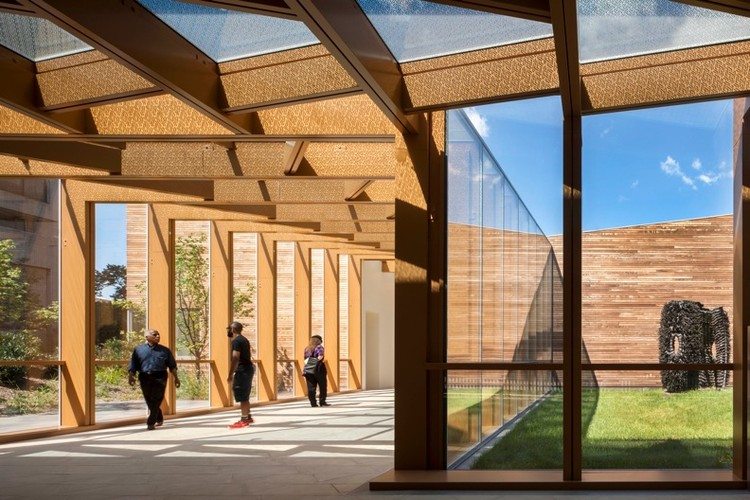Weeksville Heritage Center: Preserving The History of The Weeksville Community

Dere’s no guy livin’ dat knows Brooklyn t’roo an’ t’roo, because it’d take a guy a lifetime just to find his way aroun’ duh goddam town. An’ even den, yuh wouldn’t know it all. Thomas Wolfe, “Only the Dead Know Brooklyn”

CROWN HEIGHTS – The community of Weeksville, which spread through parts of present-day Bed-Stuy and Crown Heights, proves the truth in Wolfe’s fiction. Founded in 1838 to support the struggle for African-American suffrage in New York state, it endured for a century.
But when local historian James Hurley tried to track down references to the community from 19th-century texts, he couldn’t locate Weeksville until a volunteer pilot provided aerial photography revealing houses in an alley that lay beside what had been Hunterfly Road, a street from the days of Dutch settlement in New York that followed the track of an earlier native-American trail.
Those houses—restored to provide a snapshot of life through the years when Weeksville thrived—now stand alongside the Weeksville Heritage Center. As gentrification once again changes the face of the neighborhood, “Brooklyn’s largest African-American cultural institution” works to make sure the history of the community isn’t again lost.

The end of slavery in New York was a long process. A law passed in 1817 freed slaves born before 1799, but it didn’t take effect until 1827, and in 1830 there were still 30 people in New York waiting for emancipation.
In the midst of this process, New York changed its legal qualifications for voting. In 1826, the state constitutional convention removed the existing property requirements for white men, granting them universal suffrage, but for African-Americans, only men who owned property worth $250 or more had the right to vote.
That motivated James Weeks, a stevedore, and several other African-American investors, to purchase tracts of land in Brooklyn’s Ninth Ward. They divided their purchases into smaller plots that would meet the $250 property threshold for voting rights and advertised for other black families to make their homes in the neighborhood, which soon became known as Weeksville.
Weeksville quickly became economically self-sufficient, politically important, and a vital space of refuge. It was home to the Bethel Tabernacle AME Church and the Berean Missionary Baptist Church, Colored School No. 2, the Zion Home for the Colored Aged and the Howard Colored Orphan Asylum.
When the Fugitive Slave Act of 1850 made life perilous not only for African-Americans fleeing from the South, but for free blacks victimized by vicious “slavecatchers,” Weeksville was a place of relative safety. As the draft riots raged in Manhattan in July 1863, hundreds fled to Weeksville to escape the mobs targeting black residents of Manhattan. The community became the national headquarters of the African Civilization Society in the 1850s and the home of one of the first, and most important, African-American newspapers, the Freedman’s Torchlight.
In the years following the Civil War, Weeksville’s demographics shifted as European immigrants moved into the community in significant numbers. Their arrival wasn’t quite the same as contemporary gentrification, according to Zenzele Cooper, a tour educator at the Weeksville Heritage Center. The newcomers were typically of the same economic class as the African-Americans already living in the neighborhood. It was an early instance of black and white families living together in urban America, as Italian and German children learned to read and write in Colored School No. 2.
Brooklyn itself was changing in those years. The Brooklyn Bridge linked the borough to Manhattan and extensive roadwork began to establish the grid that determined the current face of the city.

Cooper, who was educated in theater at Rutgers, is the director for annual spring plays at the Heritage Center, but she also uses her background in the performing arts as she leads tour groups through the restored Hunterfly Road. The houses, each decorated to evoke a particular era in Weeksville’s history, provide her stage sets. Her props are artifacts uncovered by school children from the neighborhood who participated in the 1968 archaeological dig at the site following the re-discovery of the homes. Besides the tours, the Weeksville Heritage Center is home to regular programming that uses the spirit of the re-claimed community to examine the full scope of African-American history.
Two recent exhibitions, inspired by a striking photographic image of a fashionable black woman discovered at the site, focused on the evolution of clothing styles in the African-American community and examined the use of family snapshots as a means of preserving black history.

November’s events at the Center include a poetry workshop with Negus Adeyemi, who won Weeksville’s annual poetry slam, and the monthly meeting of the THNK Book Club. They will also host a discussion on choosing a school for your child in Central Brooklyn and a presentation about how Sudanese Americans living in New York will be affected by Trump’s travel ban, part of a series of conversations taking place throughout the city.
That embrace of the diversity of African-American culture has been a consistent theme in the career of the Center’s new interim Executive Director, Rob Fields. Fields, who took the post in September, has worked in marketing brands like Burger King and General Motors as well as arts organizations including the Black Rock Coalition. He’s been a conspicuous presence online for the past ten years with his digital magazine, Bold as Love.

He’s currently preparing “a slate of new initiatives and programming to celebrate how far Weeksville has come,” Fields said, as the Center anticipates the 50th anniversary in 2018 of the community’s re-discovery.
As that anniversary approaches, Weeksville continues to offer its regular tours Tuesday through Friday as well as special programming on its Weeksville Weekends events on the second Saturday of each month.
Weeksville Heritage Center
158 Buffalo Avenue, Crown Heights
Hours: Tuesday through Friday, 10am – 5pm
(Weeksville Weekends – every second Saturday of the month)




